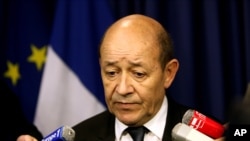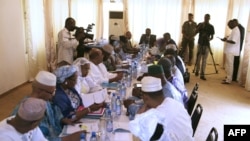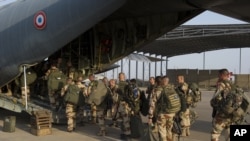Troops from Mali's neighbors are expected to start arriving Sunday to help France in the third day of a battle to push back Islamic extremists in Mali's north.
Niger, Burkina Faso and Senegal pledged on Saturday to send troops, one day after France started airstrikes against the militants.
Officials said Saturday French forces pushed rebels from Konna with airstrikes and ground forces. The recent militant takeover of the town northeast of the capital, Bamako, had put militants in a position to seize the nearby city of Mopti - the northern-most municipality under government control.
A reporter in Mali tells VOA French to Africa service that dozens of Islamist fighters were killed in the Konna operation. The reporter also said the Malian army held the town late Saturday with retreating Islamists fighters holed up in the towns of Bore' and Douentza.
French Defense Minister Jean-Yves Le Drian said Saturday a French helicopter was downed and the pilot killed during the airstrikes on Konna, which began Friday.
Al-Qaida-linked Ansar Dine militants responded to the strikes by threatening France with reprisals, prompting French President Francois Hollande to order heightened security across France. French authorities also advised all French citizens in Mali to leave the country "temporarily."
In London, British Prime Minister David Cameron ordered logistical assistance, including British transport planes, to assist the French military operation.
In December, the U.N. Security Council approved a plan for West African states to deploy at least 3,000 troops to Mali to help train the army and retake the north. None of those, however, had been expected in Mali until September.
Al-Qaida-linked groups took control of Mali's north soon after renegade soldiers overthrew the country's elected president last March. The groups have imposed a harsh form of Islamic law on the areas in their control, drawing condemnation from human rights groups.
Mali's interim president, Dioncounda Traore, declared a national state of emergency Friday and called on every Malian to help in the war effort.
"Every Malian, man and woman, should from here on out consider oneself to be a soldier of the nation and behave as such," the president said. "We call on all mining, telephone and other companies, as well as all people morally and physically able, to contribute to this fight against terrorism. All public services should put all vehicles that could be useful in the field at the service of the army without delay."
For his part, French Prime Minister Jean-Marc Ayrault said French forces in Mali are preparing for any rebel move aimed at Bamako, and that they will remain in the area as long as necessary. Ayrault said the militants are to blame for much lawlessness, including kidnappings.
Former colonial ruler France announced Friday that it had deployed troops to Mali at the request of the government.
Diplomatic sources say Traore will meet with President Hollande in Paris Wednesday, January 16.
Niger, Burkina Faso and Senegal pledged on Saturday to send troops, one day after France started airstrikes against the militants.
Officials said Saturday French forces pushed rebels from Konna with airstrikes and ground forces. The recent militant takeover of the town northeast of the capital, Bamako, had put militants in a position to seize the nearby city of Mopti - the northern-most municipality under government control.
A reporter in Mali tells VOA French to Africa service that dozens of Islamist fighters were killed in the Konna operation. The reporter also said the Malian army held the town late Saturday with retreating Islamists fighters holed up in the towns of Bore' and Douentza.
French Defense Minister Jean-Yves Le Drian said Saturday a French helicopter was downed and the pilot killed during the airstrikes on Konna, which began Friday.
Al-Qaida-linked Ansar Dine militants responded to the strikes by threatening France with reprisals, prompting French President Francois Hollande to order heightened security across France. French authorities also advised all French citizens in Mali to leave the country "temporarily."
In London, British Prime Minister David Cameron ordered logistical assistance, including British transport planes, to assist the French military operation.
In December, the U.N. Security Council approved a plan for West African states to deploy at least 3,000 troops to Mali to help train the army and retake the north. None of those, however, had been expected in Mali until September.
Al-Qaida-linked groups took control of Mali's north soon after renegade soldiers overthrew the country's elected president last March. The groups have imposed a harsh form of Islamic law on the areas in their control, drawing condemnation from human rights groups.
Mali's interim president, Dioncounda Traore, declared a national state of emergency Friday and called on every Malian to help in the war effort.
"Every Malian, man and woman, should from here on out consider oneself to be a soldier of the nation and behave as such," the president said. "We call on all mining, telephone and other companies, as well as all people morally and physically able, to contribute to this fight against terrorism. All public services should put all vehicles that could be useful in the field at the service of the army without delay."
For his part, French Prime Minister Jean-Marc Ayrault said French forces in Mali are preparing for any rebel move aimed at Bamako, and that they will remain in the area as long as necessary. Ayrault said the militants are to blame for much lawlessness, including kidnappings.
Former colonial ruler France announced Friday that it had deployed troops to Mali at the request of the government.
Diplomatic sources say Traore will meet with President Hollande in Paris Wednesday, January 16.
Some information for this report was provided by AP, AFP and Reuters.








